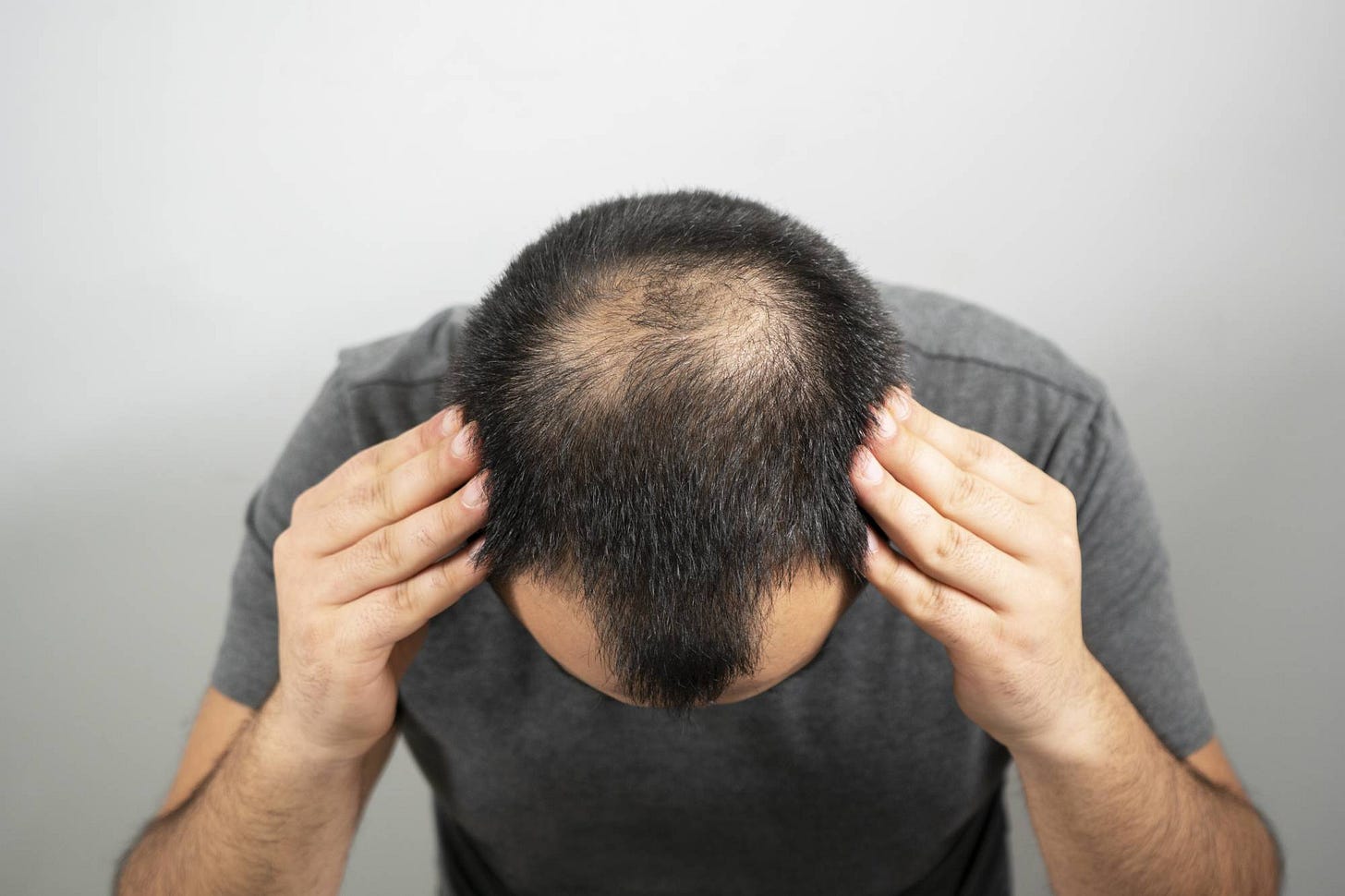Hair loss can be a debilitating and life-changing process, but it doesn’t have to be this way. So I’ve written this short-guide that explains what hair loss, prescription medication, herbal medicine and shampoos with evidence to support healthier hair.
If you’d prefer to watch video summaries, then click on the links below ▼:
TikToks:
WHY DOES HAIR LOSS OCCUR?
Well we know that genetics plays a very important role in hair loss. If your parents experienced premature hair loss then unfortunately it is likely you will too.
However there’s more to it than that.
In men, there is conversion of the sex steroid and hormone testosterone to dihydrotestosterone (DHT). DHT is more potent than testosterone and it is this hormone that causes the typical pattern of male hair loss . In women, the pathophysiology is not clear but the pattern seen usually involves thinning and greater fragility of hair.
Male pattern hair loss
PRESCRIPTION MEDICATION FOR HAIR LOSS
FINASTERIDE
As we know the mechanism for male pattern hair loss, let’s touch on it briefly. Numerous men find themselves in the dilemma of hair loss, especially as they age. There are many factors that could lead to this condition including hormonal changes, stress, certain medications, some illnesses or even genetics.
But new research suggests that some may be able to reverse the effects of hair loss by taking finasteride, which is a drug that blocks the enzyme responsible for creating dihydrotestosterone (DHT), which was found to be the cause of hair loss.
According to researchers at Columbia University Medical Center (CUMC), in clinical trials involving more than 1,200 men between ages 18 and 41 years with mild to moderate hair loss, daily treatment with finasteride led to gradual hair regrowth in more than 70 percent of those treated.
What's more, the research showed that the process works both on the crown area as well as other parts that had thinned. Reversing thesearchers said if people waited until they noticed hair was lost before using finasteride, it would be more difficult to reverse the process.
The study was published in the January 2012 issue of Journal of Clinical Endocrinology & Metabolism (JCEM).
"Our research demonstrates that by blocking the formation of DHT, finasteride promotes modest regrowth of scalp hair in men with androgenetic alopecia," said Dr. George Cotsarelis, professor and chair of dermatology at CUMC and lead author for the study.
MINOXIDIL
Minoxidil is a potassium channel opener which stimulates hair follicles and prolongs their anagen (growth) phase. It was initially used as a medicine to treat high blood pressure (hypertension) because it could relax blood vessels. However, minoxidil has the side effect of hair growth which was discovered serendipitously in clinical trials involving a different primary indication.
The US Food and Drug Administration (FDA) approved minoxidil for hair loss in 1988 under the brand name Rogaine. It is available as a 2% solution which should be applied twice daily, or as 5% foam once daily. Patients are advised to massage the medicine into the scalp for at least three minutes, then wash their hands thoroughly after applying it. Some people need to use it everyday whereas others can apply it every other day. Minoxidil does not appear to cause abnormalities in the fetus and could be used by pregnant women if necessary.
HERBS FOR HAIR LOSS
ROSEMARY OIL
A 2015 randomised controlled-trial compared rosemary oil vs minoxidil 2% in men with male pattern baldness. At the 3 month mark neither group showed significant change in mean hair count. However at the 6 month point, ‘both groups experienced a significant increase in hair count at the 6-month endpoint compared with the baseline and 3-month endpoint.’
Even more interestingly, ‘No significant difference was found between the study groups regarding hair count either at month 3 or month 6.’
PUMPKIN SEED OIL
A 2014 randomised controlled-trial compared 400mg daily of pumpkin seed oil (PSO) vs a placebo group. The study ran for 24-weeks and at the end, the authors reported:
■ self-reported improvement and self-satisfaction scores greater in the PSO group
■ More hair in the PSO group (40% in the PSO group compared to 10% in the placebo group)
SHAMPOOS FOR HAIR LOSS
Shampoos in general are damaging to hair due to the chemicals they contain often being more irritant than nourishing. However there are 2 types of shampoo that have some evidence to support their use for hair loss:
■ Caffeine shampoo
■Ketoconazole shampoo
CAFFEINE SHAMPOO
A 2020 review on caffeine shampoo covered a number of studies to analyse whether caffeine shampoo did or didn’t support hair loss. The authors concluded ‘The results obtained so far have shown that caffeine-containing treatments for hair loss can be as effective as drug-based treatments, while at the same time providing the good safety profile commonly associated with cosmetic products.’
KETOCONAZOLE SHAMPOO
A 2019 systematic review analysed the efficacy of topical ketoconazole in the treatment of male pattern baldness. The meta-analysis included two animal studies and five human studies and reported ‘Topical ketoconazole is a promising adjunctive or alternative therapy in the treatment of AGA.’
SUMMARY
Hair loss shouldn’t be as terrifying as it seemingly is as I hope you can see that there are a lot of conventional and potential treatment options available.
If you’ve suffered with hair loss and have found this newsletter and the accompanying videos helpful then please get in contact with us:
■https://linktr.ee/theherbaldocs
As always thanks for reading,
The Herbal Docs





